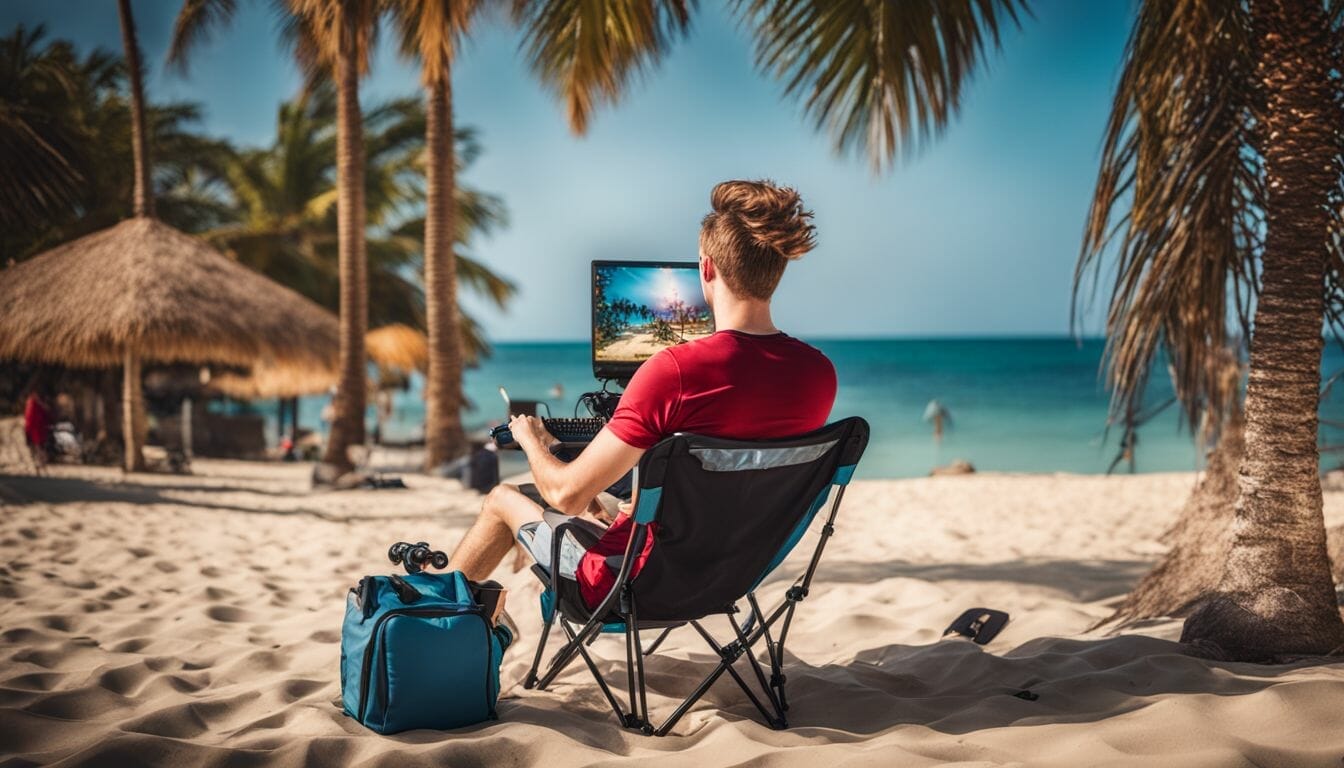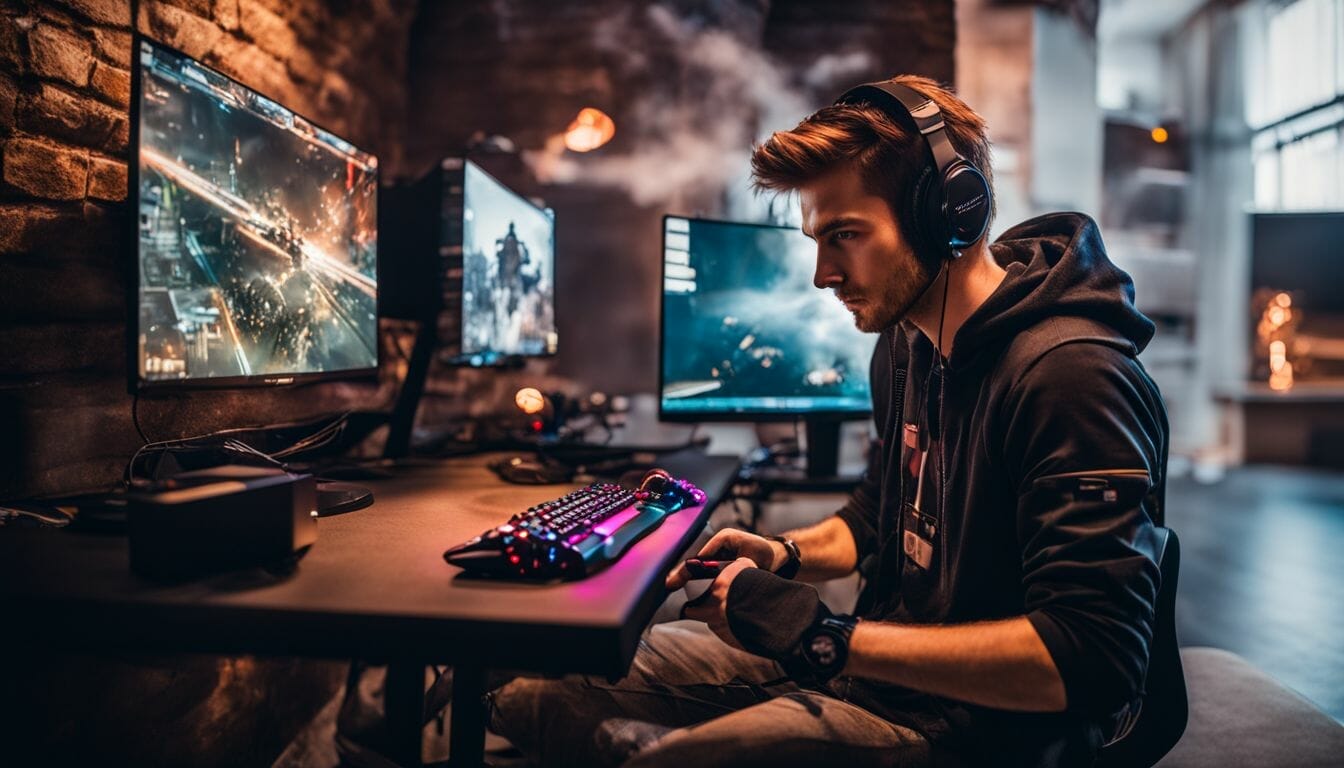Compact Gaming Powerhouses: What’s a Mini-Gaming PC

Are you a PC gamer struggling to fit a **traditional gaming PC** into a small space? You’re not alone—numerous individuals grapple with the issue of how to incorporate large gaming systems into tiny apartments or dorm rooms.
Did you know that mini-gaming PCs can be an efficient and affordable solution to your problem? This blog post is packed with information on what mini-gaming PCs are, their advantages, critical components to look out for, and factors to consider before purchasing one.
Let’s dive in!
Key Takeaways
- A mini-gaming PC is a small and portable computer specifically designed for gaming purposes, offering high-performance capabilities in a compact form factor.
- Mini-gaming PCs save space and are ideal for gamers with limited room. They can easily fit into tight spaces and are lightweight, making them convenient for gaming on the go.
- Mini-gaming PCs offer advantages such as space-saving benefits, energy efficiency, and lower costs compared to larger systems.
- Important components and specs to consider when building a mini-gaming PC include CPU and GPU recommendations, memory and storage options like DDR4 RAM and flash memory (SSD), as well as cooling solutions such as air or liquid CPU coolers.
What is a Mini-Gaming PC?

A mini-gaming PC refers to a compact and portable computer specifically designed for gaming purposes, offering high-performance capabilities in a small form factor.
Definition and purpose
A Mini-Gaming PC is a small, sleek machine built for gaming. These PCs are tiny but mighty! They’re made to fit into tight spaces while still delivering top-notch gameplay. Even with their small size, they pack a punch and can run games smoothly.
This makes them perfect for gamers who need to save space without giving up power on their favorite games.
Compact size and portability
Mini-gaming PCs are a big hit due to their small size. They can fit into tight spaces easily. You can set them up on small desks or in rooms where space is limited. These little powerhouses make life easy for gamers who have less room.
Another cool thing about these PCs is how light they are! Gamers love how they can pick up their rig and go to any gaming event with no stress at all. We know you will enjoy grabbing a mini-gaming PC for your next game night out of town!
Advantages of Mini-Gaming PCs

Mini-gaming PCs offer several advantages over traditional desktop setups for gamers. These include space-saving benefits, energy efficiency, and lower costs compared to larger systems.
Space-saving
Mini-gaming PCs are a great fit for small spaces. They save room on your desk or in your game area. You don’t need a big space to game anymore! These compact gaming rigs take up less room but still give the fun of full-size systems.
Picture this, you can have more space for other cool gamer stuff! With these small footprint gaming computers, even tiny rooms become perfect spots for epic battles and races. If you want an awesome gaming time without using much room, mini PCs are the go-to pick!
Energy efficiency
Mini-gaming PCs are a great choice for PC gamers, not just because they’re compact and portable, but also because they are more energy efficient compared to traditional gaming desktops.
This means that these small powerhouses consume less electricity, resulting in lower energy bills for you. Not only does this save you money, but it also helps conserve precious energy resources.
Another advantage of mini-gaming PCs is that their reduced power consumption means they require less cooling. In fact, some mini PCs don’t even have a fan! So if you want to game without sacrificing performance while being mindful of your energy usage and costs, consider investing in an energy-efficient mini-gaming PC.
Lower cost
Mini-gaming PCs offer a more budget-friendly option for PC gamers. Compared to high-end desktop models, mini PCs are cheaper to purchase. They also provide better specs for lower costs compared to laptops.
In fact, using a combination of a mini PC and an external graphics card can be more cost-effective than buying a high-performance gaming PC. So, if you’re looking for an affordable and economically advantageous gaming setup, a mini-gaming PC is definitely worth considering.
Components and Specs for the Best Mini-Gaming PC
When it comes to building the best mini gaming PC, there are a few key components and specs that you should consider.
CPU and GPU recommendations
Looking to build the best mini-gaming PC? Check out these CPU and GPU recommendations for top-notch gaming performance:
- AMD Ryzen 7 7800X3D: This powerful CPU delivers fast processing speeds and smooth multitasking, making it ideal for intense gaming sessions.
- Nvidia RTX 4070 Ti: With 12GB of VRAM, this GPU provides stunning graphics and realistic visuals, enhancing your gaming experience.
Memory and storage options
When it comes to memory and storage options for mini-gaming PCs, there are a few important factors to consider. Here are some key points:
- DDR4 RAM: Mini PCs for gaming typically use DDR4 RAM, which offers faster speeds and better performance compared to previous generations.
- SODIMM or SDRAM: Mini-gaming PCs often use SODIMM (Small Outline Dual Inline Memory Module) or SDRAM (Synchronous Dynamic Random-Access Memory) for storage RAM. These modules come in a 200-pin format and are specifically designed for compact systems.
- Flash memory: Flash memory, such as solid-state drives (SSD), is commonly used for storage in mini-gaming PCs. SSDs provide faster data access times and improved overall system performance.
- Corsair ONE I164: This mini-gaming PC is equipped with 32GB of DDR4 RAM, allowing for smooth multitasking and excellent gaming performance.
- Origin PC Chronos V3: The Chronos V3 mini-gaming PC features 32GB of Corsair Vengeance DDR5 RAM clocked at 5600MHz, providing even higher speeds for demanding games and applications.
- Storage requirements: The amount of storage needed for mini-gaming PCs depends on the emulators and games being played. Consider the size of the game files and any additional content you may want to store.
Cooling solutions
Keeping your mini-gaming PC cool is crucial for optimal performance and longevity. Here are some cooling solutions to consider:
- Air CPU Coolers: These are the most common cooling solutions for mini-gaming PCs. They consist of a heatsink and fan combination that helps dissipate heat generated by the CPU.
- Liquid CPU Coolers: Liquid cooling systems offer more efficient heat dissipation compared to air coolers. They use a pump, radiator, and coolant to transfer heat away from the CPU, resulting in lower temperatures.
- Extra Case Fans: Installing additional case fans can enhance airflow within the PC case, promoting better overall cooling performance.
- Heat Sinks: Heat sinks are metal components designed to absorb and dissipate heat from specific components like CPUs or GPUs.
- Water Cooling Kits: These kits include all the necessary components for setting up a liquid cooling system, such as a pump, radiator, tubing, and water block.
Considerations for Mini-Gaming PC
When choosing a mini-gaming PC, it’s important to have realistic expectations, consider optional add-ons for optimal performance, and be aware of potential overheating concerns. Read on to find out more!
Realistic expectations
When considering a mini-gaming PC, it’s important to have realistic expectations. While these compact gaming rigs can deliver impressive performance, they may not match the power of larger desktop computers.
However, with a dual-core CPU and at least 8GB of RAM, you can still enjoy a great gaming experience. Remember that building your own mini-gaming PC allows for customization according to your budget and needs.
So, keep in mind the cost of computer parts and make sure you set a realistic budget from the start. With the right components and reasonable expectations, a mini-gaming PC can be a fantastic choice for portable gaming on the go or saving space at home.
Optional add-ons
Optional add-ons can greatly enhance your mini-gaming PC experience. These additional accessories, such as gaming keyboards, mice, and monitors, can improve your gameplay and provide a more immersive environment.
You may also consider investing in gaming headsets for better audio quality or gaming chairs for added comfort during long gaming sessions. Additionally, if you need extra storage space for your games and files, there are storage solutions available that are compatible with mini-gaming PCs.
Just remember to check the compatibility of these add-ons before making any purchases to ensure they work seamlessly with your mini-gaming PC setup.
Overheating concerns
Keeping your mini-gaming PC cool is essential to ensure optimal performance and avoid overheating issues. Dust build-up on fan grills, exhausts, and inside the PC can lead to overheating, which can result in slow performance or even system crashes.
It’s important to regularly clean the fan grills and exhausts to maintain proper airflow and prevent dust accumulation. Additionally, checking the seating of the CPU’s heatsink is crucial as it helps in effective cooling and heat dissipation.
By addressing these concerns and maintaining proper thermal management, you can enjoy smooth gaming sessions without worrying about overheating problems.
Conclusion
In conclusion, a mini-gaming PC is a compact and portable computer that offers gaming capabilities in a small size. It allows gamers to enjoy their favorite games while saving space and energy.
Although it may not have the same power as a full-sized gaming PC, it provides an affordable and convenient option for gamers on the go. So, if you’re looking for a gaming solution with a smaller footprint, consider giving a mini-gaming PC a try!
Can a Mini-Gaming PC Support the Right Graphics Card for Optimal Gaming Performance?
When it comes to optimal gaming performance, it is crucial to choose the right graphics card for your mini-gaming PC. The graphics card plays a significant role in handling complex visuals and rendering them seamlessly. Make sure to select a graphics card that is compatible with your mini PC to elevate your gaming experience to new heights.
Can the Elgato USB-C Stream Deck be used with a Mini-Gaming PC?
The versatile USBC Stream Deck review reveals that it can indeed be used with a Mini-Gaming PC. Its compact design and USB-C connectivity make it compatible with various devices, offering seamless integration and enhancing the gaming experience. With its customizable buttons, it provides quick access to commands, making it a valuable tool for gamers with limited desk space.
FAQs
1. What is a mini-gaming PC?
A mini-gaming PC is a small-sized computer specifically designed for playing video games, offering high-performance hardware and graphics capabilities in a compact form factor.
2. How is a mini-gaming PC different from a regular desktop computer?
A mini-gaming PC differs from a regular desktop computer in its smaller size and specialized components optimized for gaming, such as powerful processors, dedicated graphics cards, and efficient cooling systems.
3. Can I play the same games on a mini-gaming PC as on a regular desktop?
Yes, you can play the same games on both types of computers. However, due to their smaller size, some mini-gaming PCs may have limitations in terms of upgradability or compatibility with certain hardware configurations.
4. Are mini-gaming PCs portable?
Yes, one of the advantages of mini-gaming PCs is their portability. Their compact size allows for easy transportation to LAN parties or other locations without sacrificing performance.
5. Are there any disadvantages to using a mini-gaming PC?
Some potential disadvantages of using a mini-gaming PC include limited upgrade options compared to larger desktops and potentially higher costs due to specialized components required for optimal performance in smaller form factors.

